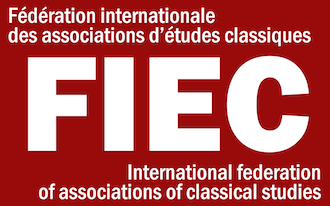New week, new face! This week's interview is featuring Fausto Montana, Professor at the University of Pavia and Adjunct Member of the new FIEC Board:
1. What is your current position at Università di Pavia?
I have been professor of Greek language and literature at Pavia University since 2000 (full professor since 2005). Apart from teaching and institutional and research responsibilities in my Department (Musicologia e Beni Culturali, located in Cremona), I hold courses at the Department of Studi Umanistici. I participate as an elected representative in the Academic Senate of my University.
2. What does your research focus on?
Since my Doctoral thesis, defended in 1994 and centered on the citations of Aristotle’s Constitution of Athenspresent in the scholia to Aristophanes’ comedies, I have been fascinated by the intertwined relationship which occurs, in the ancient and Byzantine tradition of Greek texts, between institutional and factual history, literature, and exegesis. This web of intersecting subjects and viewpoints has remained the compass of my research studies – with alternating emphasis on ancient historiography, poetry, and scholarly works – for the last thirty years. My underway projects include the co-editorship of the encyclopedic database Lexicon of Greek Grammarians of Antiquity and of the series of commented critical editions Supplementum Grammaticum Graecum (both being published by Brill) and, furthermore, such a longterm teamwork as a new critical edition of the Iliad scholia (to be published by de Gruyter).
3. What made you study the ancient world?
In my family of origin, we could not remember anybody who dealt with studies on classics. When I was 14, my parents adressed me to the Liceo Classico, where Greek and Latin (both the respective languages and histories of literature) where and are the educational core. Greek morphology (!) was the spark. I loved this way of controling a complex world of words in order to decifer amazing texts in their original sounds and forms. Thanks mainly to my first teacher in those days, I gradually convinced me of the useful and gratifying value of studying the Greek language, the ancient history, the literatures and cultures of the past. Later, as an university student, I also began to seize and understand the relevance of classics for the constantly evolving societies of our days.
4. What is your job as Adjunct Member of the FIEC board?
Apart from supporting the organization of the FIEC Congress scheduled for 2022 in Mexico City and fostering classics all around the world, which are essential missions of our Federation and shared by all the members of the board, my special task is as delegate for the Année Philologique (APh). I know quite well this fundamental tool for the study of the ancient world, having been a member of the Centro Italiano dell’Année Philologique since 1995 and of the Société Internationale de Bibliographie Classique (SIBC), the scientific editor of the APh, since 2017. I was also the Italian representative in the international Comité de rédaction of the APh in 2014-2019. In these last years, the APh has experienced important changes mainly from the technological point of view. It is crucial for the development and enhancement of classics that our old instruments keep up with the times.
5. One of the main objectives of FIEC is to foster cooperation among classical scholars! Where do you see the future for classicists in that regard?
We dispose today of a widespread technology which makes scholars able to connect and stay in touch each other in real time, as individuals and institutions as well. Accordingly, the exchange and dissemination of scientific ideas and products can travel at light speed (quite literally!). The familiarisation of people (the old generation as well, though more slowly...) with these revolutionary opportunities is ongoing and we are authorized to hope that, in a few decades or years, communication, cooperation, and sharing will become easier and more natural than in the past and even today. This tendence deserves new and appropriate opportunities also in the fields of copyright, access, and circulation of products. I see among FIEC’s targets the active promotion of this trend.
6. Another very important objective is to point out the relevance of classical studies to governmental authorities. What do you consider to be the biggest challenges as well as opportunities for classics?
I think that the most serious challenges for today classicists are (1) to prove the actual value of their studies for contemporary societies and (2) to ensure the transfer of knowledge from the old to the new means of transmission which are provided by the ongoing digital revolution and are spreading very quickly, above all among the young generations. In some Countries our disciplines are out of fashion, somewhere they are suffering like “under siege” because of communicational obsolescence and, consequently, due to a lack of money or interest. We all know what a gigantic loss would be to set classical studies apart. Therefore, we should make the strongest and most cohesive effort to disseminate this awareness of the social importance of classics also among not specialist people (public authorities as well as private individuals); and do it by overturning the defensive approach into a proactive and attractive initiative, in step with the times. Resolution, cohesion, and self-updating shall help us to succeed!



